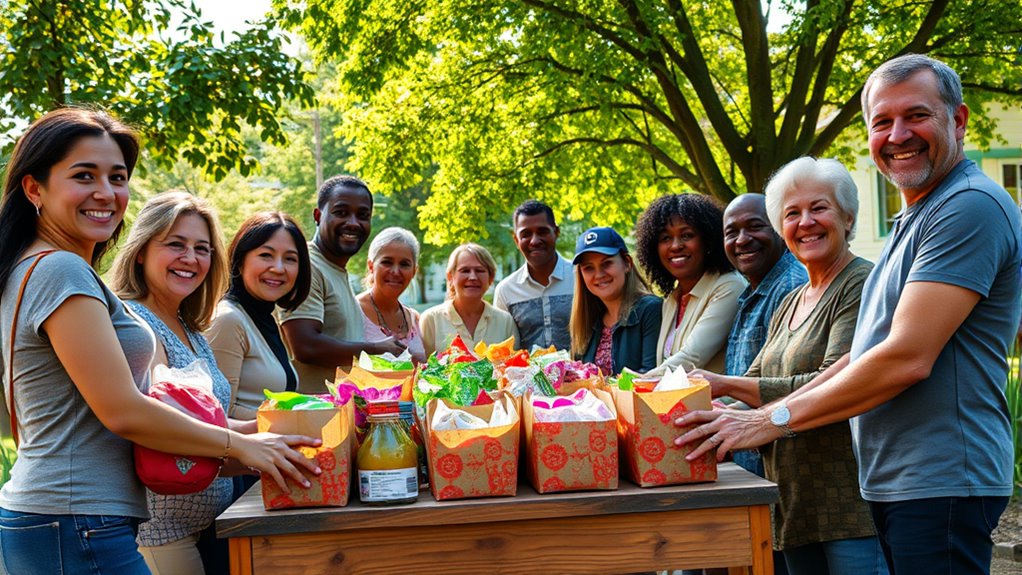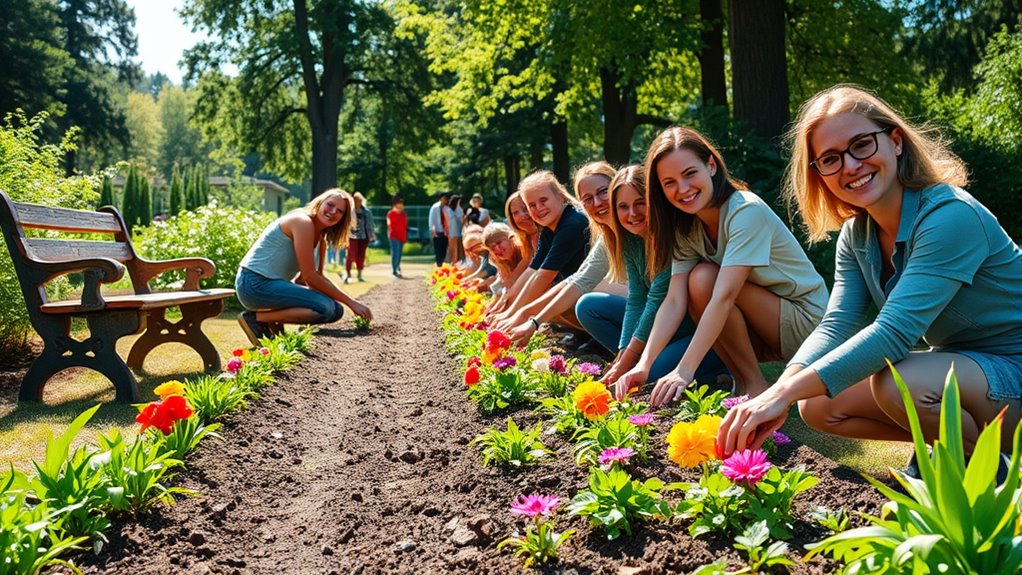Getting involved in volunteering and community activities allows you to make a real difference while building your leadership, fundraising, and strategic skills. By participating actively, you can help transform neighborhoods and boost your confidence through organizing events and rallying support. You’ll learn to communicate effectively, adapt strategies as needed, and develop resourcefulness. As you engage more, you’ll discover how these experiences can lead to personal growth and lasting community impact—just keep exploring to find out how far you can go.
Key Takeaways
- Volunteering transforms neighborhoods and individual lives through active community participation.
- It develops fundraising, communication, and strategic skills essential for effective community support.
- Engaging in community projects fosters leadership, teamwork, conflict resolution, and personal confidence.
- Strategic planning and adaptability are crucial for successful initiatives and addressing community needs.
- Active involvement inspires personal growth, empowers others, and creates a positive ripple effect in neighborhoods.

Have you ever wondered how volunteering and community involvement can transform not only your neighborhood but also your own life? When you actively participate in community projects, you open yourself up to a wealth of opportunities that go beyond helping others. One of the most impactful areas is developing effective fundraising strategies. As you get involved, you’ll learn how to rally support, communicate your cause passionately, and motivate others to contribute—skills that are essential for any successful initiative. Whether you’re organizing a charity event or securing donations, honing your fundraising strategies builds your confidence and demonstrates your ability to lead. These experiences teach you to craft compelling messages, identify potential supporters, and adapt your approach based on feedback, making you more resourceful and strategic in your efforts.
Volunteering enhances leadership, strategic skills, and community impact through effective fundraising and passionate communication.
But fundraising isn’t just about collecting money; it’s about inspiring others to believe in your cause. As you take on these challenges, you’ll naturally develop leadership skills. Leading a volunteer team or coordinating community efforts pushes you to motivate, delegate, and manage diverse personalities. You’ll discover how to set clear goals, communicate effectively, and resolve conflicts—all essential elements of leadership development. These skills extend well beyond community projects and become assets in your personal and professional life. You learn how to influence others positively, build consensus, and maintain resilience in the face of setbacks. These qualities not only make you a more effective leader but also deepen your understanding of teamwork and empathy.
Engaging in community involvement also helps you recognize the importance of strategic planning and adaptability. As you participate in organizing events or campaigns, you’ll see how successful projects require meticulous planning, clear objectives, and the flexibility to pivot when needed. This process sharpens your problem-solving skills and enhances your ability to think critically under pressure. Additionally, leveraging digital tools and platforms can greatly amplify your outreach and engagement efforts, making your initiatives more impactful. Over time, you might find yourself taking on leadership roles within your community or even initiating new projects. Each experience adds to your personal growth, making you more confident in your abilities to influence positive change.
Ultimately, volunteering and community participation serve as powerful catalysts for personal development. By immersing yourself in these activities, you not only contribute to making your neighborhood a better place but also cultivate leadership qualities and strategic thinking that benefit every aspect of your life. As you master fundraising strategies and develop your leadership skills, you’ll realize how much you’re capable of achieving. These experiences empower you to turn ideas into action and to inspire others along the way, creating a ripple effect that extends far beyond your immediate surroundings.
Frequently Asked Questions
How Can I Find Local Volunteering Opportunities?
To find local volunteering opportunities, start by researching community outreach strategies online, such as local nonprofit websites or social media groups. Attend community events to network and discover chances to get involved. Remember to follow volunteering etiquette by being respectful and committed. You can also contact local organizations directly, ask about their needs, and express your interests. This proactive approach helps you find meaningful opportunities that fit your skills and schedule.
What Skills Are Most Valuable in Community Service?
The most valuable skills in community service are definitely team collaboration and cultural awareness—because nothing says “I care” like working well with others and understanding diverse backgrounds. You’ll need to coordinate efforts smoothly and respect different perspectives. If you can master these, you’ll turn mundane tasks into meaningful change. After all, who knew that empathy and cooperation could be your secret weapons in making a real difference?
Are There Age Restrictions for Volunteering Programs?
Most volunteering programs have age restrictions based on their eligibility criteria, which vary by organization. You might need to provide background checks, especially for youth or vulnerable populations. Typically, minors can volunteer with parental consent, while some programs require volunteers to be at least 16 or 18. Check each program’s specific requirements, as age restrictions help guarantee safety and suitability for all involved.
How Do I Balance Volunteering With a Busy Schedule?
You can definitely make room for volunteering by mastering time management and prioritizing tasks. Start by scheduling specific blocks of time for volunteering, just like appointments. Be realistic about what you can handle, and learn to say no when necessary. Balancing a busy schedule isn’t about doing everything but focusing on meaningful commitments. This way, you stay involved without feeling overwhelmed, making volunteering a rewarding part of your life.
What Are the Benefits of Long-Term Community Involvement?
Long-term community involvement boosts your community impact by fostering stronger relationships and sustainable change. It also promotes personal growth, helping you develop valuable skills like leadership, empathy, and collaboration. When you commit over time, you gain a deeper understanding of local issues, making your contributions more meaningful. This ongoing engagement not only benefits others but also enriches your life, creating a sense of purpose and fulfillment that lasts.
Conclusion
Getting involved in volunteering and your community is like planting seeds that grow into beautiful, strong trees. Every hour you give and every person you help makes a difference, creating a ripple effect of kindness. Your efforts not only uplift others but also enrich your life in ways you might never expect. So, step up and participate—your involvement has the power to transform lives, including your own, one small act at a time.









